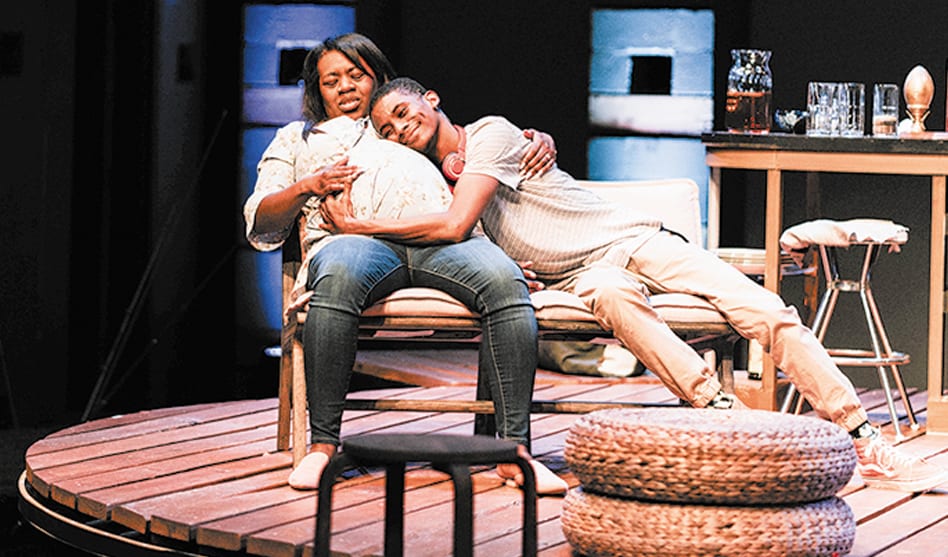A mother (Stormy Demerson) and son (Elliot Marvin Sims) bond in ‘Bread.’ (Photo/Evan Michael Woods)
WTT’s world premiere of ‘Bread’ packs a punch
ARNOLD WAYNE JONES | Executive Editor
jones@dallasvoice.com
The Bakers are a typical nuclear family of wife Ruth (Stormy Demerson), husband James (Djoré Nance), son Jr. (Elliot Marvin Sims), plus one on the way. James has been laid off for a few months, and Ruth can’t work ’til the baby comes, but they own their South Oak Cliff house in a gentrified neighborhood and are doing OK… for now. But James’ college friend Al (Calvin Scott Roberts) has a real estate scheme he wants the two to pursue, and his brash older brother Jeb (Bryan Pitts) has just returned home after two decades away in the army, with his nouveau riche girlfriend Carol (M. Denise Lee) in tow. Ruth is beset with worry — for her unborn son, for her rap-loving but inexperienced teenager, for the future. All of these points converge one day in early 2017, illuminating not only these people’s lives, but something substantive about the black experience in America today.
Bread — playwright Regina Taylor’s world premiere, now at WaterTower Theatre — employs a number of tools and tropes familiar to fans of Arthur Miller, Tracy Letts, Lorraine Hansberry and other classic American playwrights: The quasi-successful family forced to a brink by the arrival of a charismatic outsider and a flamboyant, wise-cracking woman, who compel them to confront long-buried secrets. Images of All My Sons, August: Osage County and A Raisin in the Sun burrowed in my brain early, and never escaped. This is not intended as criticism, but praise for Taylor’s careful curation of the elements of drama into layers that subtly, inevitably reveal not just the souls of her characters, but the themes of her world view.
Although set on inauguration day 2017, Bread doesn’t once reference “45” by name; it can’t be weighed down with detritus. It does, however, repeatedly mention Obama and what he meant as a beacon for African-Americans as a model of aspiration. Obama turned a page; but how close are we coming to the book being slammed shut?
Taylor explores this uncertainty with a slate of culturally-specific touchpoints: Hip-hop music (impressively rapped by Sims), African tribal chant, code-switching, couched references to lynching, mythic storytelling and, ultimately, food, as represented by bread, in all its meanings: nourishment, communal ritual, money.
The characters are sharply drawn, though complex. Ruth stands as the unifying but rigid matriarch who dominates James in the house, though he tries to exercise his independence outside to prove he’s not whipped; Al is a shady politico whose family legacy is exploiting the black community more than serving it; Jeb and James clash with Jr. over the proper behavior of a black man today — a sort of Martin-vs.-Malcolm dialectic that manifests itself in a shocking way.
The cast is uniformly excellent — there’s not a false beat — and director Leah H. Gardiner does an excellent job of overlapping the dialogue with such naturalism that you really feel you have stepped into a family barbecue. And the Dallas-centric references conjure life around the Trinity with such understanding and insight, the city becomes its own character — in many ways, it’s most tragic one, doomed and not realizing it. What a punch that packs.














